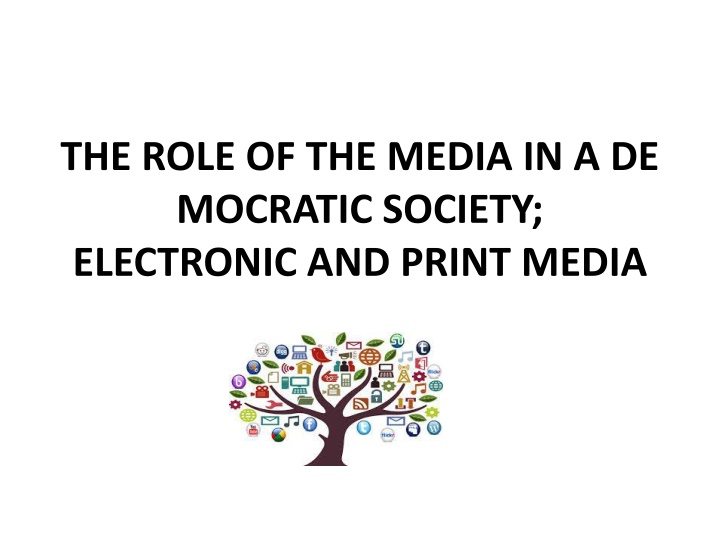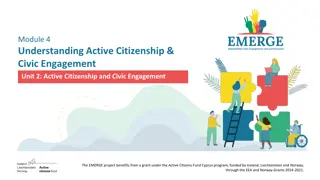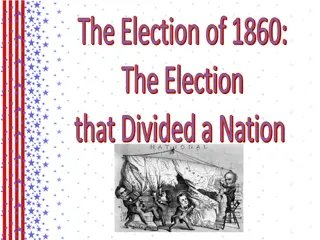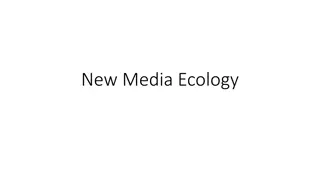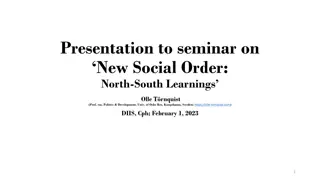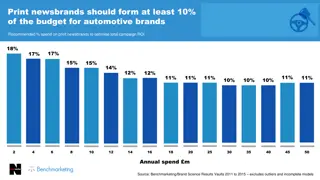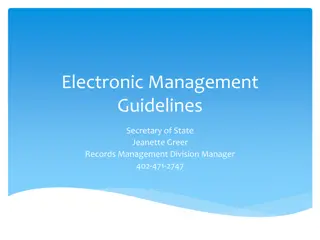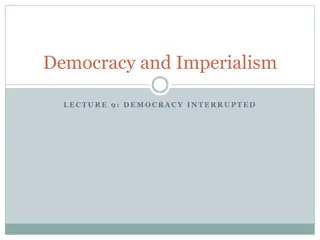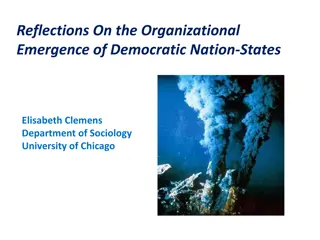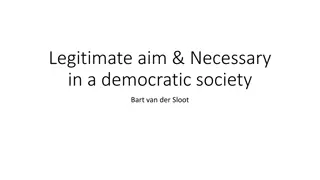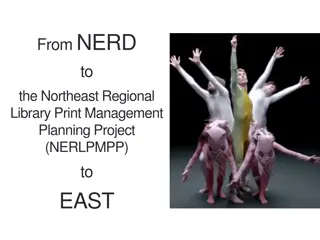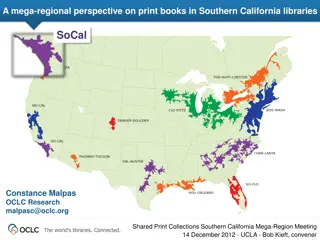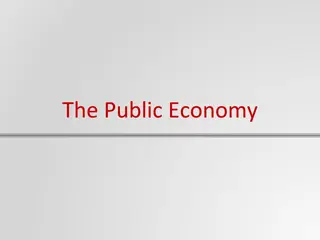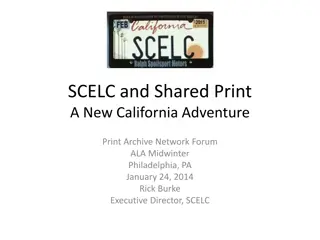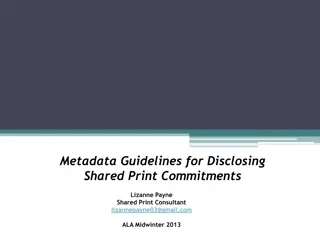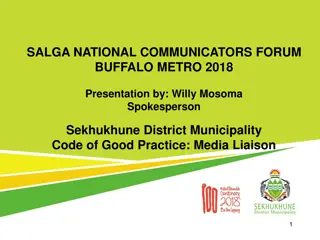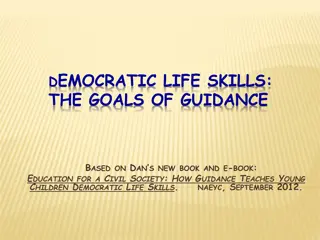The Role of Media in a Democratic Society: Electronic and Print Media Overview
Media plays a crucial role in a democratic society by informing, entertaining, and educating the public. Both electronic and print media provide news, entertainment, and valuable information to society, highlighting events, promoting open debate, exposing violations, and shaping public opinion. The responsibility of the media includes being honest, reliable, and promoting free and fair elections while differentiating between facts and opinions.
Download Presentation

Please find below an Image/Link to download the presentation.
The content on the website is provided AS IS for your information and personal use only. It may not be sold, licensed, or shared on other websites without obtaining consent from the author.If you encounter any issues during the download, it is possible that the publisher has removed the file from their server.
You are allowed to download the files provided on this website for personal or commercial use, subject to the condition that they are used lawfully. All files are the property of their respective owners.
The content on the website is provided AS IS for your information and personal use only. It may not be sold, licensed, or shared on other websites without obtaining consent from the author.
E N D
Presentation Transcript
THE ROLE OF THE MEDIA IN A DE MOCRATIC SOCIETY; ELECTRONIC AND PRINT MEDIA https://encrypted-tbn1.gstatic.com/images?q=tbn:ANd9GcTVbuxyhiqIjqJf1nPPTtMZOeXZd6TN9ZVI9AvEuv1rLnpXlWwzzw
ROLE OF THE MEDIA IN A DEMOCRAC Y Electronic media:- any media that needs elect ricity or batteries E.g. Internet, emails, websites, Facebook, Twit ter, radio, TV, films and DVD s. Print media:- includes books, newspapers, ma gazines, pamphlets, brochures, posters
The role is to inform society about daily even ts that are newsworthy and to entertain. Newspapers give us the daily national and in ternational news. TV and Radio entertain and also offer news, educational programmes and documentaries . Telephones keep people in touch. Social media allows you to interact instantly with other users.
MEDIA AND DEMOCRACY Exposes violations of human rights. Reports unlawful activity. Exposes corruption and mismanagement. Communicates, inform and educate. Entertain Give political information that can inform vote rs. Identify problems in our country and commun ities.
Promote debate and discussion. Promote nation building Gives access to diverse viewpoints and worl d views as well as sport coverage. Give publicity to successes and people who are inspiring. Shape public opinion. https://encrypted-tbn1.gstatic.com/images?q=tbn:ANd9GcQ0Xa3b_Y08hMs1ndJpxvw79lJuqnP1X7SjBZ0Pzd6V_wvPUk7vpeuQKA
The responsibility of the media includes bei ng honest, fair and reliable. Freedom of expression comes with the resp onsibility to use this freedom with care, an d to take note of the limitations of this free dom. The media reflects and influences public op inion and are powerful policy drivers. Media coverage can make or break a perso n s or a company s reputation.
Media should explain and give enough infor mation regarding things happening. They should not sensationalise. Not use headlines to sell papers. Promote free and fair elections. Differentiate between facts and opinions. Should publish corrections when mistakes a re made.
The media does not always perform their ro le in a democratic society. They sometimes misinform, harm and publi sh inaccurate versions or half truths. They often do not tell the whole story or pu t it in its true context. https://encrypted-tbn2.gstatic.com/images?q=tbn:ANd9GcRoUeLNVx11v13bGJBXM-07zTw-WaLR7MlIaSVtnD8IYUFwVe6--g
WHEN MEDIA DOES NOT FULFIL T HEIR ROLES RESPONSIBLY Media aim to satisfy the interests of their adve rtisers. News entertains rather than informs. Political news is often more about personalitie s than about the politicians work and contrib utions. The lives of famous stars are made difficult by the paparazzi who invade their private lives.
FREEDOM OF EXPRESSION AND LI MITATIONS Means that you can express your ideas and op inions freely through speech, writing, and oth er forms of communications. It is the basic right in a democratic society. It applies to everyone. it does have limitations and boundaries. People may not express viewpoints that violat e the rights of others.
CONSTITUTIONAL FREEDOM OF EX PRESSION The Constitution guarantees freedom of expre ssion for everyone. It includes: Freedom of press and other media. Freedom to receive or impart information. Freedom of artistic creativity Academic freedom and freedom of scientific r esearch.
CONSTITUTIONAL LIMITATIONS TO FREEDOM OF EXPRESSION These are the following limitations: Propaganda for war Incitement of imminent violence Advocacy of hatred that is based on race, ethn icity, gender or religion Incitement to cause harm
WHAT DOES THIS MEAN? You have freedom of speech, but cannot use h ate speech. You cannot use racist language, or discriminat e against anyone You cannot encourage people to take part in vi olence Media may not publicise and distribute anythi ng that is of a criminal nature, or that can dam age or harm people
THE PROTECTION OF THE STATE IN FORMATION BILL This Bill is also known as the Secrecy Bill becau se it proposes long jail sentences for journalist s or whistle-blowers or anyone who makes sta te secrets public. state secrets usually include information that t he general public and other countries don t ne ed to know. This information is used to protect the public a nd country.
https://encrypted-tbn0.gstatic.com/images?q=tbn:ANd9GcSG7tcJq62sPbx6OQhSJyWa5vXhuGQahB1ZF2-w09D5Pum2BA4jc4NkhQhttps://encrypted-tbn0.gstatic.com/images?q=tbn:ANd9GcSG7tcJq62sPbx6OQhSJyWa5vXhuGQahB1ZF2-w09D5Pum2BA4jc4NkhQ Whereas it is necessary to protect our count ry s state secret, there is fears that this Bill m ay be abused to protect some corrupt officia ls. The negative aspects are that this legislation may harm investigative journalists, because i t may gag or silence opinions. https://encrypted-tbn1.gstatic.com/images?q=tbn:ANd9GcTtNzvSVUTW8C5JPR8TCht6LjXGzOa_kCogzCSgMyWfOdgFVL8dAtrDnA https://encrypted-tbn3.gstatic.com/images?q=tbn:ANd9GcR21aymTLwr_vNIqFCRavHBZ34j2yj-l4_l1fQbgLIpAzS7r0i9
EXTENT TO WHICH MEDIA REPORT ING REFLECTS A DEMOCRATIC SOC IETY The following information can let you decide t he extent or level to which media reflects a de mocratic society. Topics covered Positions take by editors Space allocated Geographical distribution
CRITICAL ANALYSIS OF MEDIA AN D CAMPAIGNS It is important to critically analyse the media t o evaluate their balance and fairness in reporti ng. Pay attention too: Content, sources used, types of sensationalis m, use of shocking details, exaggeration and a ccuracy.
COVERAGE OF SPORT, SPORT PERS ONALITIES AND RECREATIONAL AC TIVITIES The media focuses more on the 5 big sports n amely: Rugby, soccer, cricket, golf and motor racing. All other sports are under reported. Sportsmen dominate the sport media over sp ortswomen. https://encrypted-tbn2.gstatic.com/images?q=tbn:ANd9GcQHWrqhMjuuU--HinpY7iJmSLgdUq_uQsOF91FlOon-kgkbd8V4
https://encrypted-tbn0.gstatic.com/images?q=tbn:ANd9GcTIuiCecFZcJ-Y3C7q32vv_S3DaOXu_tv8HpByxLdMF6VKK2lF9https://encrypted-tbn0.gstatic.com/images?q=tbn:ANd9GcTIuiCecFZcJ-Y3C7q32vv_S3DaOXu_tv8HpByxLdMF6VKK2lF9
